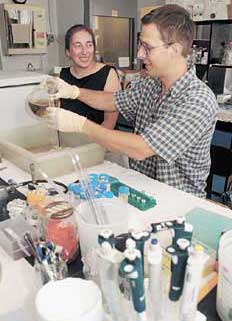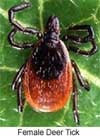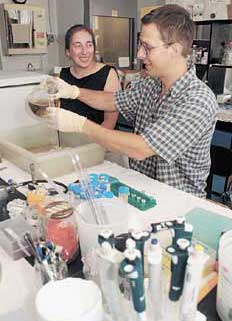 KINGSTON, R.I. – November 29, 2005 – The University of Rhode Island’s College of the Environment and Life Sciences has been awarded federal appropriations totaling more than $1 million from the U.S. Department of Agriculture for research and outreach programs involving biotechnology, Lyme disease prevention, and agricultural literacy.
KINGSTON, R.I. – November 29, 2005 – The University of Rhode Island’s College of the Environment and Life Sciences has been awarded federal appropriations totaling more than $1 million from the U.S. Department of Agriculture for research and outreach programs involving biotechnology, Lyme disease prevention, and agricultural literacy.
“We are extremely pleased that the U.S. Congress provided this much-needed funding to enable us to continue our work in disciplines that are so important to the state of Rhode Island,” said Jeff Seemann, dean of the College. “These funds wouldn’t have been awarded to us were it not for the tremendous efforts of the Rhode Island congressional delegation, so we are especially appreciative of the assistance of Senators Chafee and Reed and Representatives Langevin and Kennedy on our behalf.”
URI’s Biotechnology Research Initiative was awarded $643,000 to acquire state-of-the-art laboratory equipment for the Center for Biotechnology and Life Sciences, the $50 million facility approved by the voters in a bond referendum in 2004 that will soon be built on the north district of the Kingston campus. The funds will equip proteomics, genomics and transgenics laboratories with instrumentation that will enable URI researchers to develop a more thorough and fundamental understanding of the molecular blueprints of plants and animals. An understanding of the genetics will provide the basis for the development of new technologies for disease vaccines, disease diagnostics, agricultural production and environmental preservation.
 The new initiative follows on five previous years of funding secured by the Rhode Island delegation to bring talented new scientists to URI with expertise in biotechnology. The previous grants total $2.15 million.
The new initiative follows on five previous years of funding secured by the Rhode Island delegation to bring talented new scientists to URI with expertise in biotechnology. The previous grants total $2.15 million.
An appropriation of $150,000 will help fund activities of a new outreach office at the University to coordinate community-based tick and tick-borne disease control efforts in Rhode Island. The funds will be used to begin to develop and implement an interactive internet-based health information system providing real-time forecasts of tick disease risks and tick-bite prevention solutions for residents and visitors to the region. It will also continue the successful neighborhood outreach program launched in 2004 that provides residential tick control education.
“These two programs complement each other and provide individuals and communities with a menu of disease-prevention strategies for significantly reducing the incidence of Lyme and other insect-borne diseases,” said Thomas Mather, URI entomology professor and director of the Center for Vector-Borne Disease. “These programs will serve as models for other afflicted municipalities.”
 A $295,000 appropriation supports agricultural literacy through the development of the Rhode Island Children’s Garden Network, a collaborative effort between the College of the Environment and Life Sciences and the Rhode Island Center for Agricultural Promotion and Education. This network will provide K-12 agricultural education by supporting food and plant growing projects and include unique opportunities for student learning, curriculum development, teacher training, and horticultural technical assistance.
A $295,000 appropriation supports agricultural literacy through the development of the Rhode Island Children’s Garden Network, a collaborative effort between the College of the Environment and Life Sciences and the Rhode Island Center for Agricultural Promotion and Education. This network will provide K-12 agricultural education by supporting food and plant growing projects and include unique opportunities for student learning, curriculum development, teacher training, and horticultural technical assistance.

